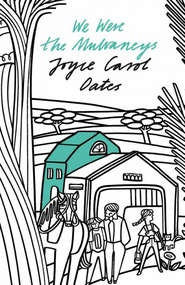По всем вопросам обращайтесь на: info@litportal.ru
(©) 2003-2025.
✖
Mudwoman
Автор
Год написания книги
2018
Настройки чтения
Размер шрифта
Высота строк
Поля
And how does the mother explain and how does the mother plead.
Proudly the woman stood and her chin uplifted and eyes shut against the Whore of Babylon there in black robes but a lurid lipstick-mouth and plucked eyebrows like arched insect wings. No more would the woman plead than fall to her knees before this whorish vision.
The children had been taken from her and placed in temporary custody of the county. But the will of God was such, all that was rightfully the woman’s was restored to her, in time.
In all those weeks, months—the woman had never weakened in her faith that all that was hers, would be restored to her.
And now at dawn the sky in the east was ever-shifting, expanding. The gray concrete-sky that is the world-bereft-of-God was retreating. Almost you could see angels of wrath in these broken clouds. Glittering light in the stagnant strips of water of the mudflats of the hue of watery blood. Less than a half mile from the Black Snake River in a desolate area of northeastern Beechum County in the foothills of the Adirondacks, where the hand of God had guided her. Here were the remains of an abandoned mill, an unpaved road and rotted debris amid tall snakelike marsh grasses that shivered and whispered in the wind. Exposed roots of trees and collapsed and rotting tree trunks bearing the whorled and affrighted faces of the damned. And what beauty in such forlorn places, Mudgirl would cherish through her life. For we most cherish those places to which we have been brought to die but have not died. No smells more pungent than the sharp muck-smell of the mudflats where the brackish river water seeps and is trapped and stagnant with algae the bright vivid green of Crayola. Vast unfathomable acres of mudflats amid cattails, jimsonweed and scattered litter of old tires, boots, torn clothing, broken umbrellas and rotted newspapers, abandoned stoves, refrigerators with doors flung open like empty arms. Seeing a small squat refrigerator tossed on its side in the mud the child thought She will put us inside that one.
But something was wrong with this. The thought came a second time, to correct—She has put us inside that one. She has shut the door.
There came a frenzy of crows, red-winged blackbirds, starlings, as if the child had spoken aloud and said a forbidden thing.
The woman cried shaking her fist at the birds, God will curse you!
The raucous accusing cries grew louder. More black-feathered birds appeared, spreading their great wings. They settled in the skeletal trees fierce and clattering. The woman cried, cursed and spat and yet the bird-shrieks continued and the child was given to know that the birds had come for her.
These were sent by Satan, the woman said.
It was time, the woman said. A day and a night and another day and now the night had become dawn of the new day and it was time and so despite the shrieking birds the woman half-walked half-carried the child in the torn paper nightgown in the direction of the ruined mill. Pulling at the child so that the child’s thin pale arm felt as if it were about to be wrenched out of its socket.
The woman made her way beyond the ruined mill which smelled richly of something sweetly rancid and fermented and into an area of broken bricks and rotted lumber fallen amid rich dark muddy soil and spiky weeds grown to the height of children. In her haste she startled a long black snake sleeping in the rotted lumber but the snake refused to crawl away rapidly instead moving slowly and sinuously out of sight in defiance of the intruder. At first the woman paused—the woman stared—for the woman was awaiting an angel of God to appear to her—but the sinuous black-glittering snake was no angel of God and in a fury of hurt, disappointment and determination the woman cried, Satan go back to hell where you came from but already in insolent triumph the snake had vanished into the underbrush.
The child had ceased whimpering, for the woman had forbade her. The child barefoot and naked inside the rumpled and torn pale green paper gown faintly stamped HERKIMER CO. DETENTION. The child’s legs were very thin and stippled with insect bites and of these bites many were bleeding, or had only recently ceased bleeding. The child’s head near-bald, stubbled and bleeding and the eyes dazed, uncomprehending. At the end of a lane leading to the canal towpath was a spit of land gleaming with mud the hue of baby shit and tinged with a sulfurous yellow: and the smell was the smell of baby shit for here were many things rotted and gone. Faint mists rose from the interior of the marsh like the exhaled breaths of dying things. The child began to cry helplessly. As the woman hauled her along the land-spit the child began to struggle but could not prevail. The child was weak from malnutrition yet still the child could not have prevailed for the woman was strong and the strength of God flowed through her being like a bright blinding beacon. Light flared off the woman’s face, she had never been so certain of herself and so joyous in certainty as now. For knowing now that the angel of God would not appear to her as the angel of God had appeared to both Abraham and Hagar who had borne Abraham’s child and had been cast into the wilderness by Abraham with the child to die of thirst.
And this was not the first time the angel of God had been withheld from her. But it would be the last time.
With a bitter laugh the woman said, Here, I am returning her to You. As You have bade me, so I am returning her to You.
First, Dolly: the woman pried Dolly from the child’s fingers and tossed Dolly out into the mud.
Here! Here is the first of them.
The woman spoke happily, harshly. The rubber doll lay astonished in the mud below.
Next, the child: the woman seized the child in her arms to push her off the spit of land and into the mud—the child clutched at her only now daring to cry Momma! Momma!—the woman pried the child’s fingers loose and pushed, shoved, kicked the child down the steep incline into the flat glistening mud below close by the ugly rubber doll and there the child flailed her thin naked limbs, on her belly now and her small astonished face in the mud so the cry Momma was muffled and on the bank above the woman fumbled for something—a broken tree limb—to swing at the child for God is a merciful God and would not wish the child to suffer but the woman could not reach the child and so in frustration threw the limb down at the child for all the woman’s calmness had vanished and she was now panting, breathless and half-sobbing and by this time though the ugly rubber doll remained where it had fallen on the surface of the mud the agitated child was being sucked down into the mud, a chilly bubbly mud that would warm but grudgingly with the sun, a mud that filled the child’s mouth, and a mud that filled the child’s eyes, and a mud that filled the child’s ears, until at last there was no one on the spit of land above the mudflat to observe her struggle and no sound but the cries of the affronted crows.
Mudwoman’s Journey. The Black River Café.
October 2002
Readied. She believed yes, she was.
She was not one to be taken by surprise.
“Carlos, stop! Please. Let me out here.”
In the rearview mirror the driver’s eyes moved onto her, startled.
“Ma’am? Here?”
“I mean—Carlos—I’d like to stop for just a minute. Stretch my legs.”
This was so awkwardly phrased, and so seemingly fraudulent—stretch my legs!
Politely the driver protested: “Ma’am—it’s less than an hour to Ithaca.”
He was regarding her with a look of mild alarm in the rearview mirror. Very much, she disliked being observed in that mirror.
“Please just park on the shoulder of the road, Carlos. I won’t be a minute.”
Now she did speak sharply.
Though continuing to smile of course. For it was unavoidable, in this new phase of her life she was being observed.
The bridge!
She had never seen the bridge before, she was sure. And yet—how familiar it was to her.
It was not a distinguished or even an unusual bridge but an old-style truss bridge of the 1930s, with a single span: wrought-iron girders marked with elaborate encrustations of rust like ancient and unreadable hieroglyphics. Already M.R. knew, without needing to see, that the bridge was bare planking and would rattle beneath crossing vehicles; all of the bridge would vibrate finely, like a great tuning fork.
Like the bridges of M.R.’s memory, this bridge had been built high above the stream below, which was a small river, or a creek, that flooded its banks after rainstorms. To cross the bridge you had to ascend a steep paved ramp. Both the bridge and the ramp were narrower by several inches than the two-lane state highway that led to the bridge and so in its approach to the bridge the road conspicuously narrowed and the shoulder was sharply attenuated. All this happened without warning—you had to know the bridge, not to blunder onto it when a large vehicle like a van or a truck was crossing.
There was no shoulder here upon which to park safely, at least not a vehicle the size of the Lincoln Town Car, but canny Carlos had discovered an unpaved service lane at the foot of the bridge ramp, that led to the bank of the stream. The lane was rutted, muddy. In a swath of underbrush the limousine came to a jolting stop only a few yards from rushing water.
Some subtle way in which the driver both obeyed his impulsive employer, and resisted her, made M.R.’s heart quicken in opposition to him. Clearly Carlos understood that this was an imprudent stop to have made, within an hour of their destination; the very alacrity with which he’d driven the shiny black limousine off the road and into underbrush was a rebuke to her, who had issued a command to him.
“Carlos, thank you. I won’t be a—a minute …”
Won’t be a minute. Like stretch my legs this phrase sounded in her ears forced and alien to her, as if another spoke through her mouth, and M.R. was the ventriloquist’s dummy.
Quickly before Carlos could climb out of the car to open the door for her, M.R. opened the door for herself. She couldn’t seem to accustom herself to being treated with such deference and formality!—it wasn’t M.R.’s nature.
M.R., whom excessive attention and even moderate flattery embarrassed terribly; as if, by instinct, she understood the mockery that underscores formality.
“I’ll be right back! I promise.”
She spoke cheerily, gaily. M.R. couldn’t bear for any employee—any member of her staff—to feel uncomfortable in her presence.
As, teaching, when she’d approach a seminar room hearing the voices and laughter of the students inside, she’d hesitate to intrude—to evoke an abrupt and too-respectful silence.
Her power over others was that they liked her. Such liking could only be volitional, free choice.
She was walking along the embankment thinking these thoughts. By degrees the rushing water drowned out her thoughts—hypnotic, just slightly edgy. There is always a gravitational pull toward water: to rushing water. One is drawn forward, one is drawn in.
Now. Here. Come. It is time….
She smiled hearing voices in the water. The illusion of voices in the water.











